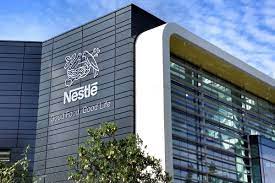-
7.44 million shares bought within four months
-
On income loss fears
-
Parent company thinks share undervalued
Global foods company, Nestle SA, the Switzerland majority shareholder in Nestle Nigeria Plc, has aggressively been involved in a share buy-back programme from the Nigerian subsidiary that has seen shares worth over N10 billion bought back within four months, it has emerged.

According to the company’s full-year audited annual reports, the Swiss firm had a cumulative 527,080,970 shares, representing 66.50 percent of the ordinary shares of the Nigerian subsidiary. But it started a series of share buybacks on May 7 with the purchase of 29,770 shares at a cost of N1400 per share, and as of Thursday, August 19, 2021, it had bought 7,444,379 volume of shares worth N10.41 billion raising Nestle S.A’s control of the Nigerian subsidiary to 67.43 percent.
A share buy-back is carried out when the management of a quoted firm considers the company’s shares undervalued and thus, reduces the number of outstanding shares which will, in turn, lead to an increase in both the share price and demand for the shares on the stock market.
Why the buyback: Nestle Nigeria in $100m bailouts from parent company
A cursory analysis of the company’s audited annual report for the full-year 2020 showed that the Nigerian business took two tranches of $100 million bailouts from its parent firm at 11.34 percent interest. The note from the report reads:
“A loan of $100 million was approved for the Company by Nestle S.A in April 2020 of which $72.5 million was drawn down as at 31 December 2020. The loan has a tenor of seven years (inclusive of a moratorium period of two years on interest payment only) commencing from April 2020.
“The facility which is unsecured attracts interest at three months USD Libor plus a margin of 1134 basis points. There is no fixed payment period agreed on in the loan contract. Payment is to be made subject to the availability of foreign exchange.
“An additional $100 million was approved for the Company by Nestle S.A in September 2020, of which $7.0 million was drawn down as at 31 December 2020. The facility which is unsecured attracts interest at three months USD Libor plus a margin of 747 basis points. There is no fixed payment period agreed on in the loan contract. Payment is to be made subject to availability of foreign exchange,” it stated.
However, in the same report, it was disclosed that as of December 2020, Nestle Nigeria’s net finance costs hopped by 302.90 percent from N938.22 million in 2019 to N3.79 billion in 2020. The company also recently released its unaudited financial reports for June 2021 in which it stated that the net finance costs expanded by 328.14 percent from June 2020 to June 2021.
David Ifezulike, signing the directors’ statement in the yearly report, said that the year 2020 was a difficult one for the firm’s business because of the effects of the COVID-19 pandemic on the Nigerian economy. He said the Nigerian consumer goods manufacturer’s input costs expanded radically as the nation was hit hard by inflation and there was a huge decrease in disposable income of shoppers because of higher power tariff burden and the expenses of petrol (premium motor spirit).
Analysts speak on Nestle Nigeria’s heavy financial leverage crisis
Commenting on the actions of the parent company to buy-back the shares of the subsidiary, Uwa Osadiaye, a senior vice president at FBNQuest Limited, responding the specific question of this action amid the $200 million loan, he said that organisations possibly repurchase shares when they feel the company shares are cheap or undervalued in the market.
“I have to expect that Nestle S.A’s management believes that Nestle Nigeria’s ability to repay the loan is good enough. They might be of the view that Nestle Nigeria’s shares are trading at a discount,” he said.
Also, an analyst who commented on the matter under anonymity said, “The parent company is undoubtedly at risk of losing income so has decided to cut losses. Looking at the loan terms, it was structured as a convertible loan with the unavailability of the FX clause.
“FX constraints will make it difficult for Nestle Nigeria to make repayments hence the share option. It’s a cheaper source of financing using the equity option rather than sourcing debt domestically. It takes the cash burden off Nestle Nigeria and allows them to do more trading,” he said.









